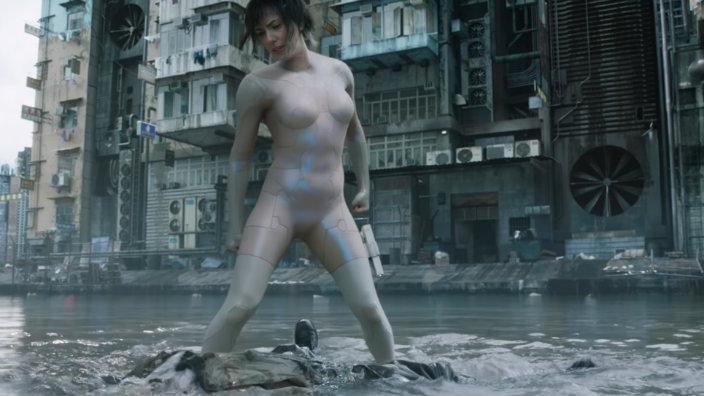It’s impossible to skip the original material but ‘Ghost in the Shell’ should work by itself. For me, it does not. I do not think it’s a bad movie, it’s visually appealing and it has powerful scenes, it’s not long (less bad) and the themes it plays are interesting, even if I raise them very superficially. While I saw her, I came to the head of the image of the director as a teenager who have been given the command and have said: what do you want to see? I never noticed an adult filmmaker controlling this promising story.
Here are the major 10 spoilers
1- The racial question is solved in an incredibly awkward way: in a THR interview with four Japanese actresses, one of them hits the nail, the problem is how they justify that Motoko and Hideo have Caucasian faces. The characters should be Western, or sign Asian actors. Another departure might have been to choose a Japanese for Hideo and justify the appearance of the protagonist in another way: for example, Dr. Ouelet (Juliette Binoche) might want to create someone with a familiar image.
2 – Motoko’s mother: aside from the disastrous portrait of a Japanese woman (again, THR interview indicates that the character has been Westernized, would never hug her daughter), nothing that happens between the protagonist and His mother makes sense. It is a subplot stuck with shoehorn to endow the character with a simple humanity, which now has a mother feels less robot. And the woman says that Johansson reminds her daughter of the attitude … nonsense.
3.Scarlett Johansson is a casting error: I guess it’s not well directed (Rupert Sanders does not seem to care about the actors) but the actress never brings anything to the character beyond a physicist who, on the other hand, does not fit me Android-heroin action they intend to sell us. It took somebody to convey the internal conflicts, not an expressionless face and a strange walk. For example, someone like Rinko Kikuchi would have been a better choice (he may not sell as many tickets, though we have already seen that Johansson is not a guarantee either).
4- Pilou Asbaek is another mistake: like Johansson, it is not well managed, but it is a poor choice for Batou. The original is more dry and rude (someone like Ron Perlman would have nailed it) and even leaving that aside, the character is a cluster of clichés that are summarized in “companion of the protagonist.” She has no identity, is loyal to Motoko and brings humor to compensate for her seriousness. And although he is human he has an amazing facility to dodge bullets …
5- The crazy shootout at the club: it’s a kind of sequence that we’ve seen a thousand times, almost seems obligatory, and with all the examples that are in the cinema to look, in ‘Ghost in the Shell’ pose one of the most absurd . There is a plan that there is no plan. They enter the two agents, each on one side, and in a short time are firing shots and killing everyone. When the protagonist is a stronger, faster and smarter droid than a human, should not she think of better ways to get the information?
6 – Suicidal characters: this is one of the aspects that almost always despair of Hollywood movies, for some reason writers believe that all their characters are suicidal and take totally unnecessary risks. The protagonist entering the mind of the hacked geisha, his superior (Takeshi Kitano) playing life in the oldest car in the city, when he is aware that they go for him, or Hideo coming physically to meet Motoko, they are only some examples.
Ghost In The Shell
7- Exaggerated atmosphere: it is a bad copy of the world of ‘Blade Runner’ to which have subtracted its interesting black cinema atmosphere to show off visual effects. It is cleaner and more modern, more boring. Everything is exaggerated, bright and big, to which is added the tendency of Sanders to abuse panoramas of the city like transition. He does not understand rhythm.
8- The poses molonas during the action: is it necessary for the protagonist to climb the walls, posturing while jumping or decorate their gestures when punching a potential witness? Being a machine, it would be normal to make the exact moves to achieve the goals, right? This is where I picture Sanders thinking of making eye-popping plans instead of thinking about the coherence of the characters or the story. Or the bike. What the hell do we need a motorcycle scene for? Because of course, of course, maybe by ‘Matrix’ or ‘Akira’.
9- The dialogues. The characters explain too much, the actors do not believe what they are saying and there are lines as stale as “We are what we do” which is supposed to be a great revelation for the protagonist. More typical of a parody than a serious film.
10- Cutter, the real villain: Peter Ferdinando gives life to another routine and empty character we have seen a thousand times, the typical evil and cruel businessman who only seeks to make money and create powerful weapons. The most ridiculous thing is that he decides to fly the spider robot (always with bad gestures); Being theoretically very expensive, should not a more specialized technician be in charge who knew how to exploit the resources of the machine? And please, you already knew that the protagonist could become invisible, how can you think that he has killed her …
Michael Pitt
11- Kuze / Hideo: The character’s possibilities are endless and in fact he is one of the best characters in the film, both for his striking appearance and for the performance of Michael Pitt, but I think they ruin it with some decisions. The romantic link is very forced and unnecessary (just him and Motoko survive!), Had enough resources to get the information without having to kill anyone and possesses the power to hack minds, use people and machines at will, and Traveling through the Net … why do you need to expose yourself when the logical thing would be not to occupy a single physical body easy to destroy?
12- The deus ex machina: there are several throughout the film but the most outrageous happens at the end, when Batou saves the protagonist just after a bullet liquidates Hideo. Just after. At the precise moment when the character of Hideo is no longer necessary for the script, exactly there, Batou saves his friend.
13- The epilogue: listening to the voice of Motoko emphasizing the lessons that he has learned during the film (“We are what we do”) and how he plans to face his life happier, taking another leap into the void to solve another mission when this time Section 9 is prepared to act … but this time jumping after the unnecessary approval of its superior. It is a summary of all the absurdity in the film.
Courtesy














